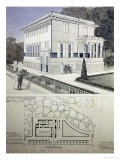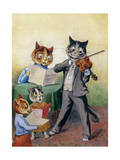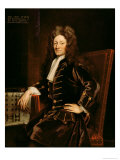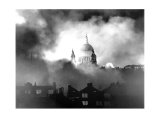|
|
|
Otto Wagner
b. 7-13-1841; Vienna, Austrian Empire
d. 4-11-1918; Vienna, Austria-Hungary
Otto Wagner, a professor of architecture, designed a new city plan for Vienna, but only his urban rail network, the Stadtbahn, was built.
Wagner also published a textbook entitled Modern Architecture espousing the use of new materials and new forms to reflect the fact that society itself was changing. espousing the use of new materials and new forms to reflect the fact that society itself was changing.
|
|
|
|
Louis Wain
b. 8-5-1860; London, England
d. 7-4-1939
The artist-illustrator Louis Wain is best remembered for his drawings featuring anthropomorphised large-eyed cats and kittens that were very popular in Victorian England.
Wain attended the West London School of Art, and taught there for several years before he turned to freelance work of country houses and livestock at agricultural shows.
The cat portraits were inspired by the family cat named Peter who was great comfort for his wife Emily as she suffered with cancer. Wain taught Peter to “wear glasses and pretend to read”, in order to amuse Emily.
Author H. G. Wells said of Wain, “He has made the cat his own. He invented a cat style, a cat society, a whole cat world. English cats that do not look and live like Louis Wain cats are ashamed of themselves.”
• music posters
|
|
|
|
Eugenius Warming
b. 11-3-1841; Denmark
d. 4-2-1924
Botanist Eugenius Warming was a main founding figure of the scientific discipline of ecology, writing the first textbook (1895) on plant ecology and teaching the first university course in ecology.
|
|
|
|
Booker T. Washington
b. 3-5-185?, Franklin Co., VA
d. 11-15-1915
Booker T. Washington, who was born into slavery, went on to become a foremost black educator and leader as the founder of Tuskegee Institute, one of the leading African-American educational institutions in America.
Booker T. Washington quotes ~ “I have learned that success is to be measured not so much by the position that one has reached in life as by the obstacles which he has overcome while trying to succeed.”
• more Booker T. Washington posters
• more Black History Biographical Timeline posters
|
|
|
|
Alice Waters
b. 4-28-1944; Chatnam, New Jersey
Chef and restaurateur Alice Waters was trained as a Montessori teacher.
From the back cover of Edible Schoolyard: More than a decade ago, Alice Waters, a small group of teachers and volunteers, and a school principal, turned over long abondoned soil at an urban public middle school in Berkeley, California, and planted the Edible Schoolyard. ...
Alice Waters quote ~
• “Kids come into the classroom and it's very hands-on, ... Kids like this. After phys ed, it's their favorite class.”
• Sharing Food Lesson Ideas
|
|
|
|
Noah Webster
b. 10-16-1758; West Hartford, CT
d. 5-28-1843
Noah Webster, lexicographer, textbook author, spelling reformer, political writer, and editor, is known as the “Father of American Scholarship and Education.” His Blue Back Speller was the text for five generations of children in the United States.
Noah Webster quote ~
• “Language is not an abstract construction of the learned, or of dictionary makers, but is something arising out of the work, needs, ties, joys, affections, tastes, of long generations of humanity, and has its bases broad and low, close to the ground.”
|
|
|
|
Alfred North Whitehead
b. 2-15-1861; Ramsgate, Kent, England
d. 12-30-1947; Cambridge, MA
Author Alfred North Whitehead is best remembered as a mathematician, philosopher and educator. He collaborated with Bertrand Russell on Principia Mathematica, an attempt to ground mathematics on logic.
Quote from poster: “Disinterested scientific curiosity is a passion for an ordered intellectual vision of the connection events. But the goal of such curiosity is the marriage of action to thought. This essential intervention of action even in abstract science is often overlooked. No man of science want merely to know. He aquires knowledge to appease his passion for discovery. He does not discover in order to know, he knows in order to discover. The pleasure which art and science can give to toil is the enjoyment which arises from successfully directed intention. Also it is the same pleasure which is yielded to the scientist and to the artist.” The Aims of Education, 1947
Alfred North Whitehead quotes ~
• “Almost all new ideas have a certain aspect of foolishness when they are first produced.”
• “The silly question is the first intimation of some totally new development.”
• “Art is the imposing of a pattern on experience, and our aesthetic enjoyment is recognition of the pattern.”
• “Art attracts us only by what it reveals of our most secret self.”
• “Fools act on imagination without knowledge, pedants act on knowledge without imagination.”
• “If a dog jumps into your lap, it is because he is fond of you; but if a cat does the same thing, it is because your lap is warmer.”
• “Familiar things happen, and mankind does not bother about them. It requires a very unusual mind to undertake the analysis of the obvious.”
• “Intelligence is quickness to apprehend as distinct form ability, which is capacity to act wisely on the thing apprehended.”
• “Life is an offensive, directed against the repetitious mechanism of the Universe.”
• “Speak out in acts; the time for words has passed, and only deeds will suffice.”
• “The art of progress is to preserve order amid change and to preserve change amid order.”
|
|
|
|
|
|
|
Eliot Wigginton
b. 11-9-1942; West Virginia
Eliot Wigginton is an oral historian, folklorist, writer and former educator most widely known for the series of Foxfire books consisting of field reports by high school students from Rabun County, Georgia. He was a recipient of a MacArthur Fellowship in 1989.
Eliot Wigginton quote ~
• “Teaching is too vital an occupation to be left to the lazy or greedy or negative,”
• “Life isn’t worth living unless you’re willing to take some big chances and go for broke.”
|
|
|
|
Laura Ingalls Wilder
b. 2-7-1867; Pepin, WI
d. 2-10-1957; Mansfield, MO
Laura Ingalls Wilder, who taught in one room country schools as a young woman, said the reason she wrote the books known as the “Little House” series was “to preserve the stories of her childhood for today's children, to help them to understand how much America had changed during her lifetime.”
FYI - Author and editor Rose Wilder Lane, Laura's daughter, was a collaborator for the books.
Did you know? Laura Ingalls Wilder was also a descendent of the Pilgrim Mayflower Delano family, making her related to Ulysses S. Grant, Franklin Delano Roosevelt, Calvin Coolidge, Conrad Aiken, and Alan B. Shepard.
Laura Ingalls Wilder quote ~
• “The trouble with organizing a thing is that pretty soon folks get to paying more attention to the organization than to what they're organized for.”
• “If enough people think of a thing and work hard enough at it, I guess it's pretty nearly bound to happen, wind and weather permitting.”
|
|
|
|
Emma Willard
b. 2-23-1787; CT
d. 4-15-1870
Emma Willard was a writer and women's rights advocate founding the first women's school of higher education in 1821, the Troy Female Seminary, later renamed the Emma Willard School (1895). Among notable students over the years were Elizabeth Cady Stanton, Justine Johnstone, Jane Fonda and Kirsten Gillibrand.
Emma Willard quotes ~
• “Genuine learning has ever been said to give polish to man; why then should it not bestow added charm on women?”
• “If, then, women were properly fitted by instruction, they would be likely to teach child wseries ren better than the other sex; they could afford to do it cheaper; and those men who would otherwise be engaged in this employment might be at liberty to add to the wealth of the nation, by any of those thousand occupations from which women are necessarily debarred.”
|
|
|
|
Mary Lou Williams, née Mary Elfrieda Scruggs
b. 5-8-1910; Atlanta, GA
d. 5-28-1981; Durham, NC (cancer)
Self taught pianist Mary Lou Williams grew up in Pennsylvania, working as early as age six to help support her large family. She wrote hundreds of compositions and arrangements, and recorded over a hundred records with such greats as Duke Ellington and Benny Goodman, as well as being a friend, mentor, and teacher to Thelonious Monk, Charlie Parker, and Dizzy Gillespie.
• Mary Lou Williams on Culture Map poster
• Piano Lesson collage by Romare Bearden
• Live at the Keystone Korner, CD
|
|
|
|
Edward O. Wilson
b. 6-10-1929; Birmingham, AL
Biologist, naturalist, conservationist, author and professor, E. O. Wilson, is a two time winner of the Pulitzer Prize for General Non-Fiction. His specialty is myrmecology, the study of ants; he originally chose to study insects because he lost the sight in one eye as a child and observing at a distance was difficult, however a shortage of pins during WWII caused him to switch to ants that could be stored in a vial. Adaptation?
|
|
|
|
|
|
|
Carter Godwin Woodson
b. 12-19-1875; New Canton, VA
d. 4-3-1950; Washington, DC
Historian, author, and journalist Carter G. Woodson is best remembered as the “Father of Black History” and for establishing Black History Week that is now Black History Month.
Woodson, the son of former slaves, was self taught up to entering Douglass High School at age 20, where he earned a diploma in two years. Woodson then taught school and went on to earn a degree from Berea College (1903), and advance degrees from the University of Chicago (1908) and Harvard University (1912).
FYI ~ Woodson's parents, James and Elizae Riddle Woodson, moved their family to West Virginia when they heard that a high school for blacks was being built.
Carter G. Woodson quotes ~
• “I am a radical.”
• “In our so-called democracy we are accustomed to give the majority what they want rather than educate them to understand what is best for them.”
• “This crusade is much more important than the anti-lynching movement, because there would be no lynching if it did not start in the schoolroom.”
• “The mere imparting of information is not education.”
• “When you control a man's thinking you do not have to worry about his actions.”
• “Those who have no record of what their forebears have accomplished lose the inspiration which comes from the teaching of biography and history.”
• “In the long run, there is not much discrimination against superior talent.”
• “If the Negro in the ghetto must eternally be fed by the hand that pushes him into the ghetto, he will never become strong enough to get out of the ghetto.”
• “The strongest bank in the United States will last only so long as the people will have sufficient confidence in it to keep their money there.”
• “The so-called modern education, with all its defects, however, does others so much more good than it does the Negro, because it has been worked out in conformity to the needs of those who have enslaved and oppressed weaker peoples.”
|
|
|
|
|
Sir Christopher Wren
b. 10-20-1632; East Knoyle, Wiltshire, England
d. 2-25-1723; London
Christopher Wren, a respected scientist, mathematician, professor of astronomy at Oxford and a founder of the Royal Society, is considered the greatest English architect of the 17th century.
Wren played an important part in rebuilding London after the Great Fire of 1666, designing 53 London churches, including St Paul's Cathedral. The picture of St. Paul's surviving in the midst of of WWII is iconic of both London and the war.
• His Invention So Fertile: A Life of Christopher Wren
|
|
|
|
Heinrich Zimmer
b. 12-6-1890; Greifswald, Germany
d. 3-20-1943; New York
Historian and professor Heinrich Zimmer was an Indologist specializing in South Asian art. He is most known for his works, Myths and Symbols in Indian Art and Civilization and Philosophies of India, that were edited for posthumous publication by Joseph Campbell.
Heinrich Zimmer quotes ~
• “With the compelling convincingness of dreams, which are vague yet exact, the ghost voice draws us (to ourselves and all of our component selves), lifts them casually out of the well of the past – the well wherein nothing is lost, the deep well of forgetfulness, and remembrance – and tosses them mockingly on the glassy table surface of our consciousness. There we are forced to consider them. There we are forced to regard, analyze, and re-understand.” The King and the Corpse
• “The best things cannot be told.”
• “Truth appears differently in different lands and ages according to the living materials out of which its symbols are hewn.” Philosophies of India
|
|
|
|
Howard Zinn
b. 8-24-1922; Brooklyn, NY
d. 1-27-2010; California
Professor Howard Zinn taught political science at Boston University from 1964 to 1988. Among his more than 20 books was the influential “A People's History of the United States”.
Howard Zinn quotes ~
• “History is instructive. And what it suggests to people is that even if they do little things, if they walk on the picket line, if they join a vigil, if they write a letter to their local newspaper. Anything they do, however small, becomes part of a much, much larger sort of flow of energy. And when enough people do enough things, however small they are, then change takes place.”
• “We don't have to engage in grand, heroic actions to participate in the process of change. Small acts, when multiplied by millions of people, can transform the world.”
• “Dissent is the highest form of patriotism.”
• “You can't be neutral on a moving train.”
• “Voting is easy and marginally useful, but it is a poor substitute for democracy, which requires direct action by concerned citizens.”
• “If those in charge of our society - politicians, corporate executives, and owners of press and television - can dominate our ideas, they will be secure in their power. They will not need soldiers patrolling the streets. We will control ourselves.”
• “I'm worried that students will take their obedient place in society and look to become successful cogs in the wheel - let the wheel spin them around as it wants without taking a look at what they're doing. I'm concerned that students not become passive acceptors of the official doctrine that's handed down to them from the White House, the media, textbooks, teachers and preachers.”
• “(Nationalism is) a set of beliefs taught to each generation in which the Motherland or the Fatherland is an object of veneration and becomes a burning cause for which one becomes willing to kill the children of other Motherlands or Fatherlands.”
• “I am not an absolute pacifist, because I can't rule out the possibility that under some, carefully defined circumstances, some degree of violence may be justified, if it is focused directly at a great evil. Slave revolts are justified, and if John Brown had really succeeded in arousing such revolts throughout the South, it would have been much preferable to losing 600,000 lives in the Civil War, where the makers of the war — unlike slave rebels — would not have as their first priority the plight of the black slaves, as shown by the betrayal of black interests after the war. Again, the Zapatista uprising seems justified to me, but some armed struggles that start for a good cause get out of hand and the ensuing violence becomes indiscriminate. Each situation has to be evaluated separately, for all are different. In general, I believe in non-violent direct action, which involve organizing large numbers of people, whereas too often violent uprisings are the product of a small group. If enough people are organized, violence can be minimized in bringing about social change.”
• “We need to decide that we will not go to war, whatever reason is conjured up by the politicians or the media, because war in our time is always indiscriminate, a war against innocents, a war against children.”
• “One certain effect of war is to diminish freedom of expression. Patriotism becomes the order of the day, and those who question the war are seen as traitors, to be silenced and imprisoned. ”
• “What most of us must be involved in – whether we teach or write, make films, write films, direct films, play music, act, whatever we do – has to not only make people feel good and inspired and at one with other people around them, but also has to educate a new generation to do this very modest thing: change the world.”
• “The term “just war” contains an internal contradiction. War is inherently unjust, and the great challenge of our time is how to deal with evil, tyranny, and oppression without killing huge numbers of people.”
• “Why should we accept that the “talent” of someone who writes jingles for an advertising agency advertising dog food and gets $100,000 a year is superior to the talent of an auto mechanic who makes $40,000 a year? Who is to say that Bill Gates works harder than the dishwasher in the restaurant he frequents, or that the CEO of a hospital who makes $400,000 a year works harder than the nurse or the orderly in that hospital who makes $30,000 a year? The president of Boston University makes $300,000 a year. Does he work harder than the man who cleans the offices of the university? Talent and hard work are qualitative factors which cannot be measured quantitatively.”
• “While some multimillionaires started in poverty, most did not. A study of the origins of 303 textile, railroad and steel executives of the 1870s showed that 90 percent came from middle- or upper-class families. The Horatio Alger stories of “rags to riches” were true for a few men, but mostly a myth, and a useful myth for control.”
• “Whenever I become discouraged (which is on alternate Tuesdays, between three and four) I lift my spirits by remembering: The artists are on our side! I mean those poets and painters, singers and musicians, novelists and playwrights who speak to the world in a way that is impervious to assault because they wage the battle for justice in a sphere which is unreachable by the dullness of ordinary political discourse.”
• Peace Education posters
|
|
|
|
|
|
|
In the United States a polished apple is a traditional gift for the teacher and a symbol of education. I always associated the apple with the “forbidden” fruit of knowledge in the story of Eve and the Garden of Paradise.
• food posters
• goddess posters
|
|
|

























